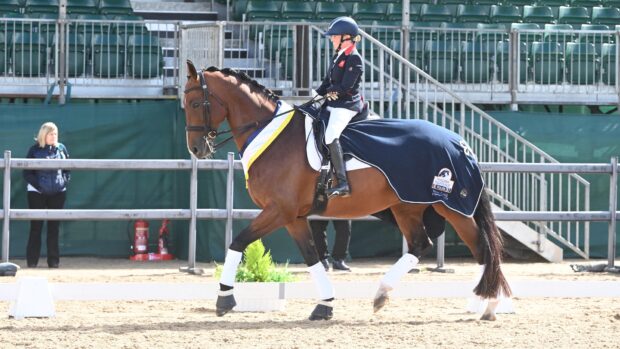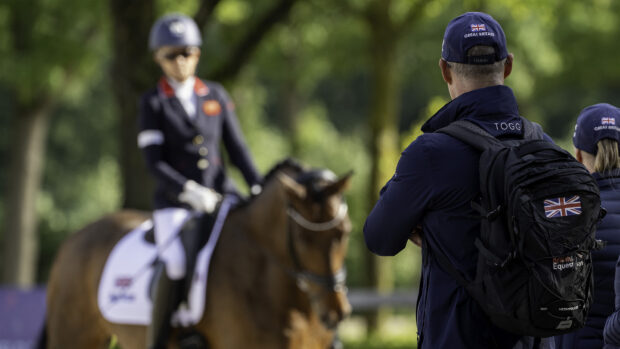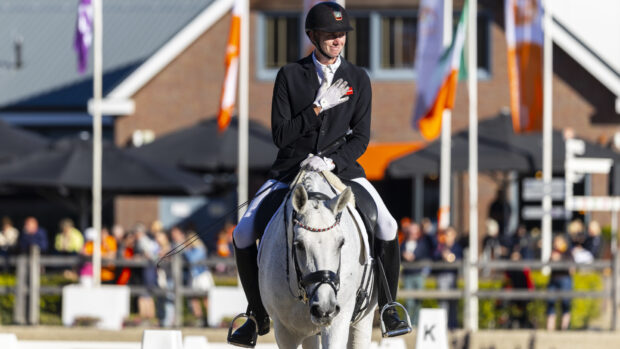The possibility of a return to para riders’ being allowed to compete in a higher grade than the one they were allocated is being discussed as part of an ongoing review into classification.
Sir Lee Pearson has long advocated for riders to have the choice to “compete up”, and he raised the subject again at the World Para Dressage Championships last month (report, 18 August).
“The able-bodied world wouldn’t be able to tell you you can’t do something nowadays, but I don’t know why the FEI para dressage [committee] can tell you that you can’t compete against that less disabled person,” said the grade II rider and 14-time Paralympic gold medal-winner, who competes to grand prix in able-bodied competition.
“You’d be taken to court in the real world if you said, ‘No you can’t go to work with able-bodied people, Lee.’”
He acknowledged the safety concerns, but also pointed out that it is “not actually always the safest thing to stay in walk” with the horses involved in the sport now, adding that there are “enough reasons” for the technical committee to look at it.
In 2005, the year before para dressage joined the ranks of disciplines regulated by the FEI, Lee won two silver medals at the European Championships in Hungary with Blue Circle Boy competing in grade III (now grade IV), despite being officially classified as a grade Ib (now grade II rider). The rules have since changed, which means riders are no longer allowed to compete in a higher grade than the one they have been allocated.
Each Paralympic sport has its own sport-specific classification system, which is underpinned by the International Paralympic Committee’s (IPC) international standard for physical impairments.
In para dressage, riders are allocated one of five grades depending on their physical ability. The system is set out by the FEI and has been adopted by British Equestrian.
In 2019, IPC president Andrew Parsons cited improving classification as a “top priority”.
“We cannot continue what we’ve been doing for the past 20 years as the movement has grown and moved on a lot,” he said at the organisation’s general assembly that year.
This resulted in the review of the 2015 IPC athlete classification code in January 2021 – an “extensive three-year process with open consultation at its core” – which is in the middle of the second of its three consultation phases. Final documents are set to be published in 2024.
Responding to the points raised by Lee, an IPC spokesman told H&H the 2015 code outlines that “athletes should compete in the sport class they are allocated unless an international federation provides a provision for an alternative”.
“Competing up a class is a topic for discussion as part of the ongoing IPC classification code review,” he added. “As part of the review, a wide range of stakeholders including athletes, international federations and classification experts are invited to share their views through various consultation exercises.”
H&H also put Lee’s points to the FEI.
An FEI spokesman told H&H the aim of the grading system is to “ensure that the impact of impairment is minimised and sporting excellence and technical proficiency determines which athlete or team is ultimately victorious”.
She added: “The FEI para dressage rules on ‘competing in different grades’, which was amended in 2018 to comply with the IPC 2015 athlete classification code, requires athletes to compete in their allocated grade following classification, thereby supporting the competition structure.
“The FEI para equestrian classification rules and the FEI para dressage rules are reviewed annually to ensure that para equestrian sport remains aligned with the ideals and aims of the Paralympic movement, and that our sport continues to play a vital part in the future of the Paralympic movement.”
You might also be interested in:

Subscribe to Horse & Hound magazine today – and enjoy unlimited website access all year round

H&H’s expert guide to Paralympic dressage classification and grades

Athlete classification in paralympic sports to be reviewed *H&H Plus*
Horse & Hound magazine, out every Thursday, is packed with all the latest news and reports, as well as interviews, specials, nostalgia, vet and training advice. Find how you can enjoy the magazine delivered to your door every week, plus options to upgrade your subscription to access our online service that brings you breaking news and reports as well as other benefits.




